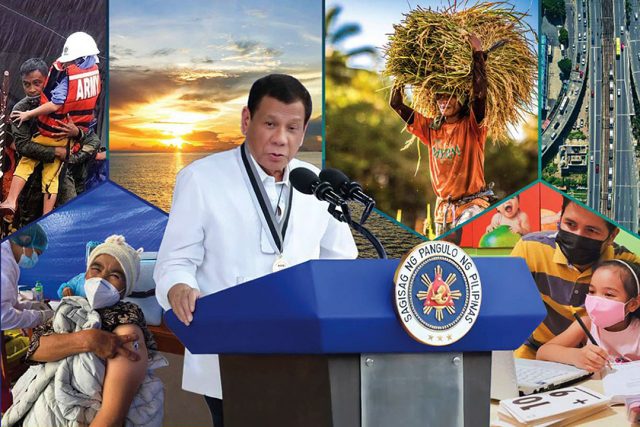The economic mistakes of the Duterte administration

Introspective
Calixto V. Chikiamco

T
his article is not meant to denigrate the economic achievements of the Duterte administration, nor to say the administration has achieved nothing but blunders. In fact, from a structural standpoint, the previous administration committed more grievous sins: extending the monopoly of the National Food Authority (NFA) and killing the initiative to change the economic provisions of the Constitution.
The purpose of this article is to highlight the mistakes so that the succeeding administration would not repeat them. The economic scarring taking place and the depth of the recession leave the succeeding administration no room for error. The future of the young generation of Filipinos hinges on the next administration doing things right the first time.
What then are the economic mistakes of the current administration?
1.
Appointing the wrong people in key Cabinet positions.
I wouldn’t say “incompetent” but certainly “wrong,” because they brought an anti-development mindset to their positions.
The Leftist appointments — to the Department of Agrarian Reform (DAR) and Department of Social Welfare and Development (DSWD) — were certainly a mistake. In the case of former Department of Agrarian Reform Secretary Rafael Mariano, with his leftist oriented policies, he scared possible investors in agriculture. For example, he tried extending coverage of a clearly failed land reform program and tried to undo even successful joint venture programs (e.g., the Marsman case).
Appointing a populist politician to the key Cabinet portfolio of agriculture was also a major mistake. Agriculture Secretary and former Governor Manny Piñol had no programs in agriculture beyond free irrigation and free fertilizer. He actively opposed the dismantling of the NFA rice importation monopoly.
Another mistake was the appointment of the late Gina Lopez to the Department of Environment and Natural Resources (DENR), not because Gina was an environmentalist, but because she had an extremist ideology that was anti-development. Responsible mining has a significant role in our economy — it generates export revenue and creates jobs in the countryside — but Gina Lopez had to have none of it. She even banned open pit mining, which is an accepted practice in many parts of the world, for example, in Australia and Canada, where responsible mining is practiced.
President Duterte did make course corrections, but already halfway in his term. The damage had been done.
There may have been political reasons for President Duterte to make those appointments, and he may have had the leeway to do them — the economy was growing 6% per annum at the time — but the next administration won’t have the luxury of making wrong appointments to key Cabinet positions.
2.
Shifting away from PPP (Public-Private Partnership) to ODA (Official Development Assistance) and the Government Appropriations Act to finance and execute major infrastructure projects.
The problem with President Duterte is that he brought his city mayor mentality to the National Government. He was an activist mayor who thought he could make National Government work in the same way City Hall does.
The reality is that the national bureaucracy is corrupt, inefficient, and ineffective. The Department of Public Works and Highways (DPWH) and DoTr (Department of Transportation) regularly under accomplished and underspent their budgets. ODA from China suffered from long delays and the cost didn’t turn out any cheaper than if these had been done under a solicited PPP (Public-Private Partnership) arrangement. The Kaliwa Dam, which had been slated for a PPP, was scrapped in favor of Chinese ODA. President Duterte will soon be ending his term yet construction hasn’t even started.
President Duterte also had deep suspicions of the Makati-based oligarchy that seemed to corner the choice PPP projects. His tirades against the water companies are a reflection of President Duterte’s mindset. But this created an environment in which the government was viewed as not honoring its contracts, thereby chilling private sector interest in PPP.
3.
Neglect of Agriculture.
President Duterte, like all presidents before him, played politics with agriculture. He appointed a politician, Manny Piñol, to the DA. All that former DA Secretary Piñol did for agriculture were populist policies — free irrigation and free fertilizer — that didn’t do anything for agricultural productivity. The result is that Duterte will end his term with an agriculture growth rate way below population growth rate.
To his credit, President Duterte did make a course correction and appointed the competent Dr. William Dar to the Department of Agriculture. Unfortunately, this was another case of too little and too late. Before Secretary Dar could accomplish his programs, the department was confronted by the African Swine Fever in pork production and the COVID-19 pandemic, which disrupted the agricultural market and supply chains. The budget which should have gone to agriculture went to the health sector instead.
4.
Wrong timing of reforms
. The administration spent its political capital in pushing through the Corporate Recovery and Tax Incentives for Enterprises (CREATE) Act. CREATE was able to revamp the fiscal incentive system to make it more performance-based and time-bound. In a sense, CREATE was a major accomplishment for fiscal reform.
However, the supply side effects of the tax cut in CREATE will be negligible unless investment restrictions are liberalized. The administration is now trying to do this by pushing for the passage of the amendments to the Public Service Act, Retail Trade Liberalization Law, and Foreign Investments Act.
The problem is that these liberalization measures are being pushed in the last two minutes of the Duterte administration, when President Duterte is seen as a lame duck and his popularity is waning. Consequently, the vested interests, who don’t want competition to threaten their oligopolistic positions in the telecommunications and transport sectors, have been emboldened and are doing their best to dilute these bills, thanks to a few misguided senators.
Moreover, President Duterte wasted the early years of his administration touting Federalism and Revgov, political solutions that won’t solve the country’s ills. Instead, at the height of his political popularity, he should have pushed for changes to the economic provisions of the Constitution and pushed for more investment liberalization measures. He could, for example, have also pushed for bilateral free trade deals with the United States or gotten the country to apply for membership in the Comprehensive and Progressive Agreement for Trans-Pacific Partnership (CPTPP), of which Vietnam and Malaysia had long been members.
5.
Mismanagement of the pandemic.
The administration’s mismanagement of the pandemic qualifies as a major economic blunder. Its heavily militaristic response, especially in 2020, caused the economy to suffer its worst contraction in decades. But the heavily militaristic response, with little or no regard for its economic effects, didn’t yield any public health benefit. The Philippines remains last in resiliency and low in country rankings in managing the pandemic.
To top it off, President Duterte eroded trust in institutions with the massive graft and corruption surrounding his administration’s response.
That said, these shortcomings don’t overshadow the administration’s single biggest achievement: the Rice Tariffication Law (RTL). No President ever dared dismantle the NFA’s monopoly in rice importation before President Duterte, given the entrenched syndicates in the NFA and the milking cow it became for the NFA leadership.
RTL benefited more than 100 million rice consumers, including farmers themselves who consume rice during the lean season, and has helped stabilize rice prices.
A more modest achievement is the improvement in broadband services with the entry of a third telco (Dito) and other measures which include an executive order liberalizing satellite broadband, a law on number portability, and reducing the number of permits for putting up cellphone towers.
To sum up, if we are to learn from the economic mistakes of the Duterte administration, the next administration must appoint competent leadership in the key Cabinet positions, not just in the economic cluster. It must pay attention to agriculture and adopt the right structural reforms. It must make solicited PPP a key component of Build, Build, Build.
Most importantly, it must spend its political capital on solving the principal binding constraints to Philippine economic growth early on: land fragmentation in agriculture, rigidities in the labor market, statism and overregulation in many sectors of the economy (e.g., fishery and forestry), unfriendly laws on foreign investment, and the dominance of monopolies in key strategic industries. This is the only way for the economy to bounce back.
Calixto V. Chikiamco is a member of the board of IDEA (Institute for Development and Econometric Analysis).
